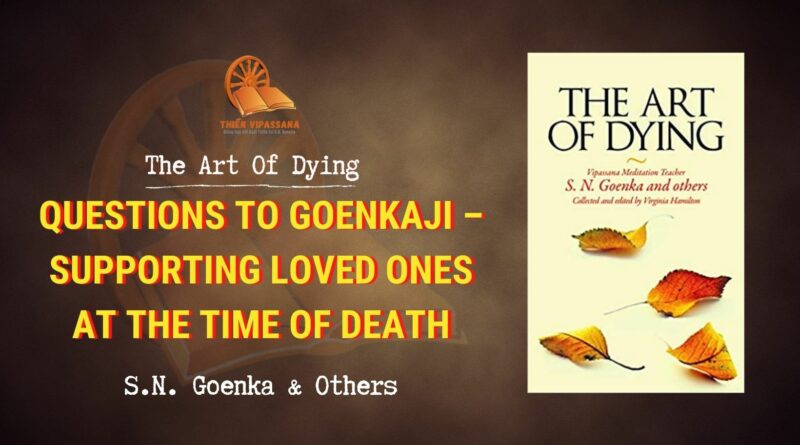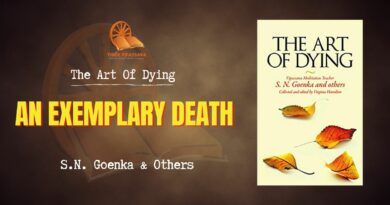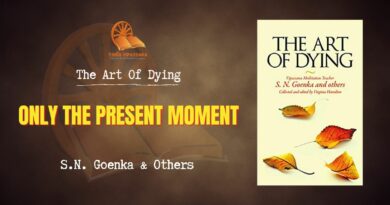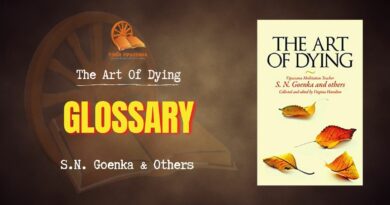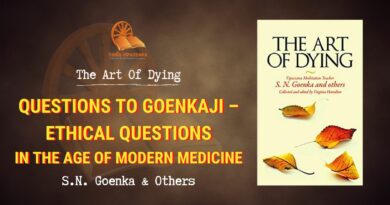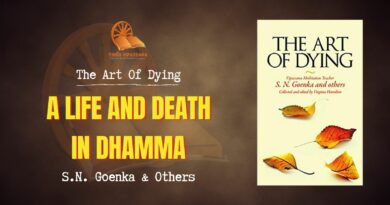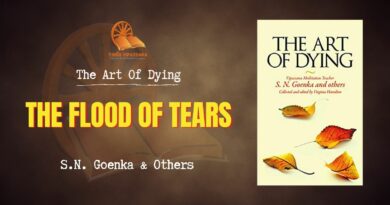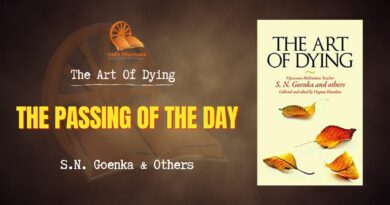Questions to Goenkaji – Supporting Loved Ones at the Time of Death
Student: It seems that mettā works, for it is a common experience that when we meet a saintly person we feel better. When we share mettā with someone who has died, does this person feel better? Also, there is a belief that, by giving dāna in the name of someone who has died, an ancestor or friend, it helps them. Does this belief accord with Dhamma?
Goenkaji: When you say that mettā “works,” what does this mean? It means that if your mind is pure and you are practicing mettā, you are generating vibrations of mettā. These vibrations can go anywhere—to this loka or that loka, to a lower field or a higher field, anywhere. When your mettā vibrations come in contact with the being to whom you direct them, he or she feels happy because these are vibrations of Dhamma, of peace, of harmony.
When you donate something in the name of someone who has passed away and say, “May the merit of my donation go to so-and-so,” whatever you donated obviously does not go to that person. However, your volition to help this person is one of mettā, and those vibrations will flow toward your ancestor or friend and he or she will feel a sense of elation from them. Because these vibrations have a base of Dhamma, something or other will happen to take him or her toward Dhamma in this or a future life. That is how we are helping those who are in lower fields, or even in higher ones.
And now, what do you donate? You donate the best thing you have—your own meditation. Therefore, at the end of your meditation hour or at the end of a meditation course, you remember anyone who is very dear to you or who has passed away, and you say, “I share the merits of my meditation with you.” This is your mettā. Because you have meditated, the vibrations going to that person are the strong vibrations of Dhamma. You are sharing your meditation with the person.
Naturally it is very helpful.
I worry that those who are getting on in years will keep going through continuous rounds of birth and death because of their attachments—my mother, who is attached to constantly worrying, and a friend very near death who feels that she has been wronged all her life. Can anything be done? Perhaps mettā?
Yes. Mettā. In addition, keep explaining the law of nature: the more you worry the more you are harming yourself. And there is a technique that can relieve you of this worry.
One cannot say for sure, but they may have a seed of Dhamma from the past. If they get a few words of encouragement, they might be attracted to Dhamma and learn how to relieve themselves of their misery.
If your parents have died, can you benefit them in some way?
Yes, you can. After each of your sittings of meditation, remember them and share your merits with them: “I share with you whatever merits I have gained. May you also feel peaceful and happy.” These vibrations will touch them wherever they are. It is not the vibrations themselves that will work some wonder for them; rather, your parents will get attracted toward Dhamma and, who knows, they might find the path. This is the only way: share your merits.
How can family members help at the time of death?
It is always beneficial for the dying person if members of the family are Vipassana meditators. They should make a point of being present so they can meditate and generate mettā. When everybody is calm and quiet, this is wonderfully supportive for the dying person and will help him or her in retaining a calm and quiet mind at the time of death.
Quite often people who are dying in a lot of pain are given strong painkillers such as morphine. For a meditator, is it better to try to work with the pain so that the mind is clear at the moment of death?
It depends on how much the meditator can endure at the time. If, because of pain, the person is reacting with aversion: “Oh, I can’t bear this pain!” then you can’t be sure that he or she will die with equanimity. So offer some pain medication.
But if the meditator is working with the pain with a balanced mind, wanting to observe things as they are, then don’t impose anything. If a meditator is dying and observing calmly without taking medicine, that is his or her choice.
As my mother was dying, she was not happy when we gave her sleeping pills; they made her eyes heavy. Even after taking the sleeping pills, she didn’t sleep. She said, “I’m quite happy if I don’t get sleep. Why do you want me to sleep?” In her mind, pills were unnecessary and interfered with her meditation.
At the time, there was another old lady next door who was also dying of cancer. The pain for her was unbearable. Her room was on the fourth floor but her cries could be heard on the first. So it all depends on the attitude of the patient.
If the dying person is a meditator, how can we help?
This is wonderful. Meditate with her. Give mettā. Listen to some chanting. Because she is a meditator, these things can be done easily.
You can ask her to practice ānāpāna or, if she can feel sensations, to stay with sensations. Like this, help her very gently to maintain the awareness of anicca. She will be receptive because she is a meditator, so offer her guidance even in meditating. Someone may do that; others can sit and meditate. Listen to some quiet chanting—not too loud; even an experienced meditator may find loud sounds too intense. The Karaṇīya-mettā Sutta and the Maṅgala Sutta would be beneficial.
Otherwise, remain very quiet. Members of the family, even if not meditators themselves, will know what meditation is. They will know that a Vipassana meditator is dying, and they should abstain from creating an atmosphere of sadness or distress that might tend to make her a little sad as well. One has to be very careful.
If the dying person is not a meditator, can we presume to give Dhamma advice if he has shown no interest in the Dhamma in the past?
No. If he still does not have any faith in Dhamma and you start giving advice, he could generate negativity—“What are these people talking about?”—and it will be harmful. That is why, even in courses, we cannot give Dhamma unless someone requests it. Dhamma should only be given to someone who is receptive. If he is not receptive, that means he is not requesting Dhamma and so we are imposing it. And if, at the time of death, you try to impose something and negativity arises in his mind, then you have started to harm him. However, if you feel that he is positive toward Dhamma, although he has not taken a course, and he can appreciate what you are saying, then you may say a few words about Dhamma.
Can a Vipassana meditator help dying friends and relatives?
If the dying person is a Vipassana meditator, then other meditators can sit nearby and practice Vipassana. This helps to charge the atmosphere with vibrations of purity, love and compassion for this friend or relative. It helps the person retain her purity of mind at the time of death—this has been witnessed many times. If the dying person is not a Vipassana meditator, meditating still helps to purify the atmosphere around her, but obviously it is not as effective as with a meditator.
Jātipi dukkhā,
jarāpi dukkhā,
byādhipi dukkho,
maraṇampi dukkhaṃ,
appiyehi sampayogo dukkho,
piyehi vippayogo dukkho,
yampicchaṃ na labhati tampi dukkhaṃ,
saṇkhittena pañcupādānakkhandhā dukkhā.
Birth is suffering,
aging is suffering,
sickness is suffering,
death is suffering,
association with the unpleasant is suffering,
dissociation from the pleasant is suffering,
not to get what one wants is suffering:
in short, the five aggregates of attachment are suffering.
—Dhammacakkappavattana Sutta, Saṃyutta Nikāya 5.1081
Bài viết này được trích từ cuốn sách The Art of Dying – Thiền Sư S.N.Goenka và nhiều tác giả khác.

